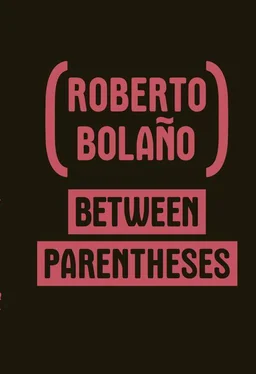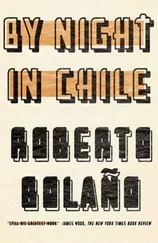Roberto Bolaño - Between Parentheses - Essays, Articles and Speeches, 1998-2003
Здесь есть возможность читать онлайн «Roberto Bolaño - Between Parentheses - Essays, Articles and Speeches, 1998-2003» весь текст электронной книги совершенно бесплатно (целиком полную версию без сокращений). В некоторых случаях можно слушать аудио, скачать через торрент в формате fb2 и присутствует краткое содержание. Год выпуска: 2011, Издательство: New Directions, Жанр: Публицистика, Критика, на английском языке. Описание произведения, (предисловие) а так же отзывы посетителей доступны на портале библиотеки ЛибКат.
- Название:Between Parentheses: Essays, Articles and Speeches, 1998-2003
- Автор:
- Издательство:New Directions
- Жанр:
- Год:2011
- ISBN:нет данных
- Рейтинг книги:4 / 5. Голосов: 1
-
Избранное:Добавить в избранное
- Отзывы:
-
Ваша оценка:
- 80
- 1
- 2
- 3
- 4
- 5
Between Parentheses: Essays, Articles and Speeches, 1998-2003: краткое содержание, описание и аннотация
Предлагаем к чтению аннотацию, описание, краткое содержание или предисловие (зависит от того, что написал сам автор книги «Between Parentheses: Essays, Articles and Speeches, 1998-2003»). Если вы не нашли необходимую информацию о книге — напишите в комментариях, мы постараемся отыскать её.
The Savage Detectives
Between Parenthese
Between Parentheses: Essays, Articles and Speeches, 1998-2003 — читать онлайн бесплатно полную книгу (весь текст) целиком
Ниже представлен текст книги, разбитый по страницам. Система сохранения места последней прочитанной страницы, позволяет с удобством читать онлайн бесплатно книгу «Between Parentheses: Essays, Articles and Speeches, 1998-2003», без необходимости каждый раз заново искать на чём Вы остановились. Поставьте закладку, и сможете в любой момент перейти на страницу, на которой закончили чтение.
Интервал:
Закладка:
Since crime seems to be the symbol of the twentieth century, in Amis’s memoirs there’s also a serial killer, the infamous Fred West, in whose yard the remains of eight women were found, among them a cousin of Amis’s who disappeared years ago. But when Amis approaches the abyss he closes his eyes because he knows, like a good college student who has read his Nietzsche, that the abyss can look back. Ellroy knows it too, whether or not he’s read his Nietzsche, and that’s the main difference between them: he keeps his eyes open. In fact, he doesn’t just keep his eyes open. Ellroy is capable of dancing the conga with the abyss staring back at him.
Amis’s book isn’t bad. But almost all his previous books are better. Those who seek in Experience the author of Money or London Fields or The Information or Night Train will be disappointed. Ellroy’s book, in contrast, is a model book. The second and third parts, which describe Ellroy’s childhood and adolescence after his mother’s death, are the best things written in the literature of any language in the last thirty years.
Amis’s book ends with children. It ends with peace and love. Ellroy’s book ends with tears and shit. It ends with a man alone, standing tall. It ends with blood. In other words, it never ends.
THE CURIOUS MR. ALAN PAULS
The first thing I read by Pauls was an utterly original short story, “El caso Berciani” [The Berciani Case], published in Buenos Aires , an anthology edited by Juan Forn (Anagrama, 1992). In this collection, alongside texts by writers as relevant as Piglia, Aira, Saccomanno, or Fresán, the story by Mr. Pauls stood out for a number of reasons, the most notable of which was an anomaly: there was something in “El caso Berciani” that suggested a wrinkle in the space-time continuum, not just in the plot (which didn’t actually have anything to do with that, by which I mean that it wasn’t science fiction or anything of the kind) but in the links between the events described, in the story’s fierce, scarcely visible entropy; in the arrangement of paragraphs and sentences.
For a long time I was a fervent reader of Pauls, having read just a single story. I didn’t know much about him: he was born in Buenos Aires in 1959, he had published two novels that I could never find, El pudor del pornógrafo [The Modesty of the Pornographer] and El coloquio [The Colloquium], and an essay on Manuel Puig. So for a long time I had to be satisfied — and this was more than enough — with reading and rereading “El caso Berciani,” which by this point, it’s clear, seemed to me a perfect story, if there’s such a thing as perfect monsters, which isn’t exactly a reasonable assumption to make.
Until one day I came into contact with the fabulous Mr. Pauls. I don’t know whether I wrote to him or he wrote to me. I think it was he. A letter so deadpan that it left me in awe. Trembling, even. In it he told me about a car trip he’d taken with his daughter, a girl about the age of my son, maybe a little younger. The trip, as far as I could tell after reading the letter ten times (a vice acquired with “El caso Berciani”), had begun in the center of Buenos Aires and ended in the suburbs. The younger Pauls seemed to be a very intelligent child. Her father, an expert driver. The world, inhospitable. I answered the letter by sending greetings to the girl, from me and also from my son. Maybe that wasn’t the proper thing to do, because Pauls took his time getting back to me, claiming some mysterious problem with his computer. His daughter ignored the greetings from my son.
A little while later I read two stories or two fragments of a hypochondriacal or medical saga by Mr. Pauls, which as far as I know are still unpublished. Both stories or fragments or whatever they are seemed perfect to me, perfect monsters. By now, as any reader will understand, all I wanted was to read more. So I asked Rodrigo Fresán (who not only is a friend of Mr. Pauls but for a while was his neighbor) to make off with everything by the author on his next trip to Argentina. So I read Wasabi , his third and as-of-now latest novel, in which he describes the growth of a boil and the ultimate impossibility of controlling it, and his book of essays on Borges, The Borges Factor , a great book, like Wasabi , but one that from the beginning presents a series of Borgesian dilemmas: on the title page it says that the book is by Alan Pauls and Nicolás Helft, but on the copyright page it’s explained that the text is by Alan Pauls and the images were generously provided by the Archives of the San Telmo Foundation. So why is Nicolás Helft credited on the cover as one of the authors? And who is Nicolás Helft? According to Fresán, Nicolás Helft is the owner of some of the illustrations or reproductions that appear in the book. I don’t believe it. Nor do I believe that it’s a pseudonym created by Mr. Pauls, who’s little given to such elaborate games, but rather the shadow of a shadow, the shadow of a Polish count, for example, or the shadow of a certain disheartening clarity.
I remember a letter that Mr. Pauls wrote to me a long time ago now. In it he told me that he had gone with his wife — and presumably his daughter — to a Uruguayan hippie commune. Not to live, he explained, but to spend a few days. During those few days all he did was read a long novel, or so I understood after reading his letter ten times, and he watched a kind of dune that the wind kept shifting from place to place in the most obvious way. The strange thing was that no one noticed it. But so it is always, my dear Mr. Pauls, I thought after the tenth reading. You’re one of the best living Latin American writers and there are very few of us who know it and can appreciate it.
JAVIER ASPURÚA AT HIS OWN FUNERAL
Not long ago, I learned of the death of Javier Aspurúa from a friend on his way through Barcelona and from a message that arrived by email. The particulars of this death, as is often true in such cases, were not entirely clear. Aspurúa, I calculate, must have been over seventy. He was sick, according to one of my informants; he only had a cold, according to the other. The point is that one afternoon, as he was convalescing in the town where he lived — Quilpué or maybe Villa Alemana, I’ve forgotten which — a car hit him and he stopped breathing or, in other words, he died.
Some friends and acquaintances say that he made his first appearance in the literary world — the professional literary world, such as it is — when he was fifty-five, others when he was past sixty, after an obscure early retirement from some government job. Like an apparition, he sluiced along courses (or irrigation channels, since we’re using hydrographic metaphors) of the strictest propriety. As far as anyone knows, he wrote only book reviews. As far as anyone knows, his complete works appeared in the newspaper Las Últimas Noticias , and, though I may be wrong, a one-hundred page volume might suffice to contain them.
I met him in 1999, in Santiago. It was the first and last time I saw him. He was at the offices of Las Últimas Noticias to turn in a review; I was there with Andrés Braithwaite and Rodrigo Pinto. I thanked him for a positive review he’d written of one of my books. He blushed and gazed up at the ceiling. Then we went to a bar and at some point during the night there were more than eight people at our table and we were all talking and pontificating, except for Javier Aspurúa, who sat in silence. Next to him was a plastic bag full of books. At one point, the general conversation didn’t interest me, and I leaned over and asked him what books he’d bought. He handed me the bag so I could take a look: English novels. We talked about some of the authors. Later on Mr. Aspurúa consulted his watch and said that he had to go because otherwise he would miss the last bus to Quilpué or Villa Alemana.
Читать дальшеИнтервал:
Закладка:
Похожие книги на «Between Parentheses: Essays, Articles and Speeches, 1998-2003»
Представляем Вашему вниманию похожие книги на «Between Parentheses: Essays, Articles and Speeches, 1998-2003» списком для выбора. Мы отобрали схожую по названию и смыслу литературу в надежде предоставить читателям больше вариантов отыскать новые, интересные, ещё непрочитанные произведения.
Обсуждение, отзывы о книге «Between Parentheses: Essays, Articles and Speeches, 1998-2003» и просто собственные мнения читателей. Оставьте ваши комментарии, напишите, что Вы думаете о произведении, его смысле или главных героях. Укажите что конкретно понравилось, а что нет, и почему Вы так считаете.












